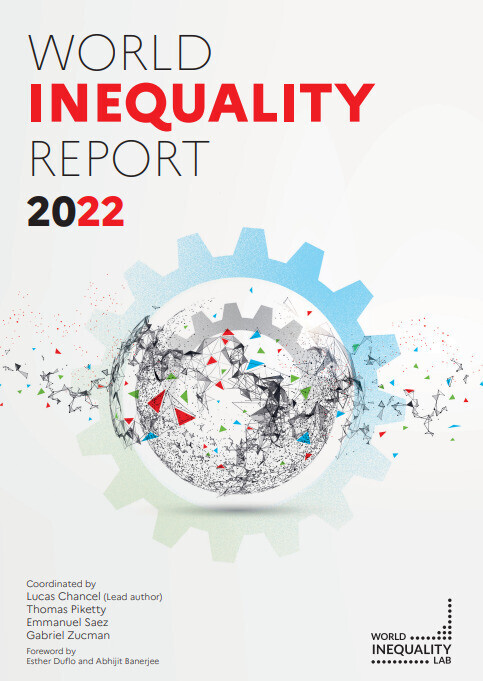hankyoreh
Links to other country sites 다른 나라 사이트 링크
[Editorial] For an affluent but unequal society like S. Korea, redistribution is the answer

Income levels on par with affluent Western European countries, but worse inequality.
That was the assessment of South Korea that appeared in the World Inequality Report 2022, published Tuesday by the World Inequality Lab.
The message is that while Korea has joined the ranks of advanced economies in terms of income, social unity remains extremely weak due to a failure to effectively achieve distributional justice.
The latest report was the second published in four years (after a previous one in 2018) by the World Inequality Lab, with researchers such as Paris School of Economics professor Thomas Piketty taking part. According to this year’s report, the wealthiest 10% in the world accounted for 52% of all income and 76% of assets this year.
Current inequality is on par with the peak years of Western imperialism in the early 20th century. For wealth inequality, the situation is even worse.
South Korea has been no exception to the trend.
The report calculated the average income of South Korea’s adult population this year at 33,000 euros at purchasing power parity. That’s a similar level to the UK, Spain and Italy.
But the disparity between Korea’s top 10% and the bottom 50% was a difference of 14 times — as much as double the levels in Western European countries such as France (seven times), Italy (eight), Spain (eight), the UK (nine), or Germany (10).
In terms of wealth, South Korea’s top 10% owned 52 times as much as the bottom 50%, indicating an even more severe level of inequality than for income.
Women accounted for 32.4% of all earned income. It’s a higher rate than in Japan (28%) or India (18%), but lower than the 38% in Western Europe or the 41% in Eastern Europe. Inequality is everywhere.
As the report points out, the growth of income and wealth inequality in South Korea is related to the era of accelerated growth, where “development came with liberalization and deregulation economic policies in a context of weak social protection.” The demographic trend of rapid population aging also continues to exacerbate poverty and disparities.
Income and wealth inequality continue to grow because government efforts to improve the situation have failed to keep up with the rate of decline. In 2012, South Korea’s top 10% accounted for 44.9% of income; that rate has risen by 1.6 percentage points to 46.5% as of this year.
If this growing inequality is left unaddressed without proactive redistribution policies, it has the potential to escalate into severe social conflict.
The World Inequality Lab advocates progressive taxation policies to raise revenues that can be invested in education, health, and other areas. Unfortunately, the percentage of South Koreans who agree that the government should play an active role in reducing the income gap has been declining. Another factor here is the low level of trust in government redistribution policies.
We need systematic research to closely examine these factors and boost the public’s trust in policy approaches.
Please direct questions or comments to [english@hani.co.kr]

Editorial・opinion
![[Column] Season 2 of special prosecutor probe may be coming to Korea soon [Column] Season 2 of special prosecutor probe may be coming to Korea soon](https://flexible.img.hani.co.kr/flexible/normal/500/300/imgdb/original/2024/0426/3317141030699447.jpg) [Column] Season 2 of special prosecutor probe may be coming to Korea soon
[Column] Season 2 of special prosecutor probe may be coming to Korea soon![[Column] Park Geun-hye déjà vu in Yoon Suk-yeol [Column] Park Geun-hye déjà vu in Yoon Suk-yeol](https://flexible.img.hani.co.kr/flexible/normal/500/300/imgdb/original/2024/0424/651713945113788.jpg) [Column] Park Geun-hye déjà vu in Yoon Suk-yeol
[Column] Park Geun-hye déjà vu in Yoon Suk-yeol- [Editorial] New weight of N. Korea’s nuclear threats makes dialogue all the more urgent
- [Guest essay] The real reason Korea’s new right wants to dub Rhee a founding father
- [Column] ‘Choson’: Is it time we start referring to N. Korea in its own terms?
- [Editorial] Japan’s rewriting of history with Korea has gone too far
- [Column] The president’s questionable capacity for dialogue
- [Column] Are chaebol firms just pizza pies for families to divvy up as they please?
- [Column] Has Korea, too, crossed the Rubicon on China?
- [Correspondent’s column] In Japan’s alliance with US, echoes of its past alliances with UK
Most viewed articles
- 1AI is catching up with humans at a ‘shocking’ rate
- 2‘We must say no’: Seoul defense chief on Korean, USFK involvement in hypothetical Taiwan crisis
- 3[Column] Season 2 of special prosecutor probe may be coming to Korea soon
- 4Is Japan about to snatch control of Line messenger from Korea’s Naver?
- 5Up-and-coming Indonesian group StarBe spills what it learned during K-pop training in Seoul
- 6The dream K-drama boyfriend stealing hearts and screens in Japan
- 7Is N. Korea threatening to test nukes in response to possible new US-led sanctions body?
- 8S. Korea “monitoring developments” after report of secret Chinese police station in Seoul
- 9Ferry accident likely due to whale; 1 killed
- 10[Column] ‘Choson’: Is it time we start referring to N. Korea in its own terms?